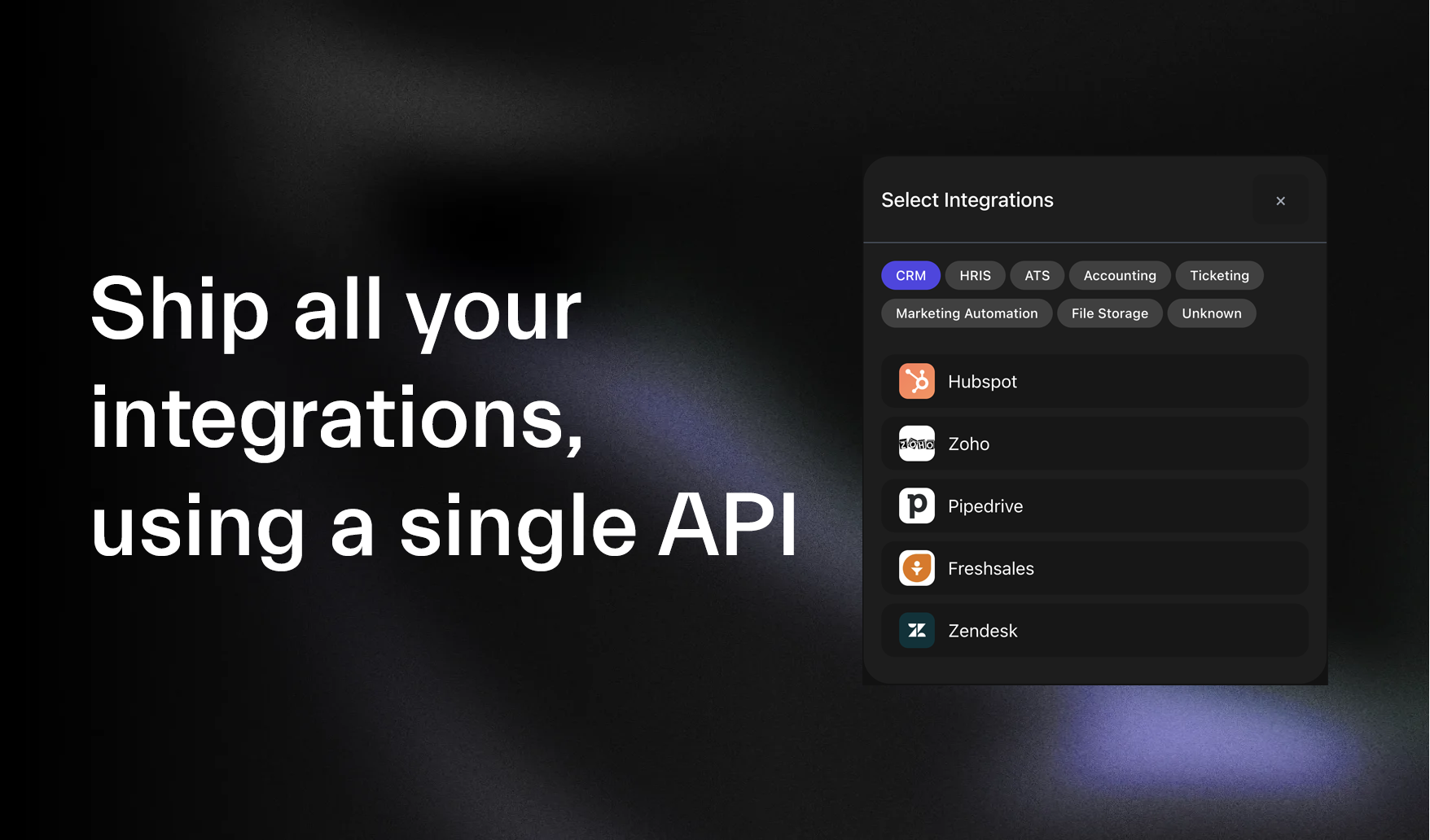
Panora
One API to connect your data sources to your LLMs
Stars: 868
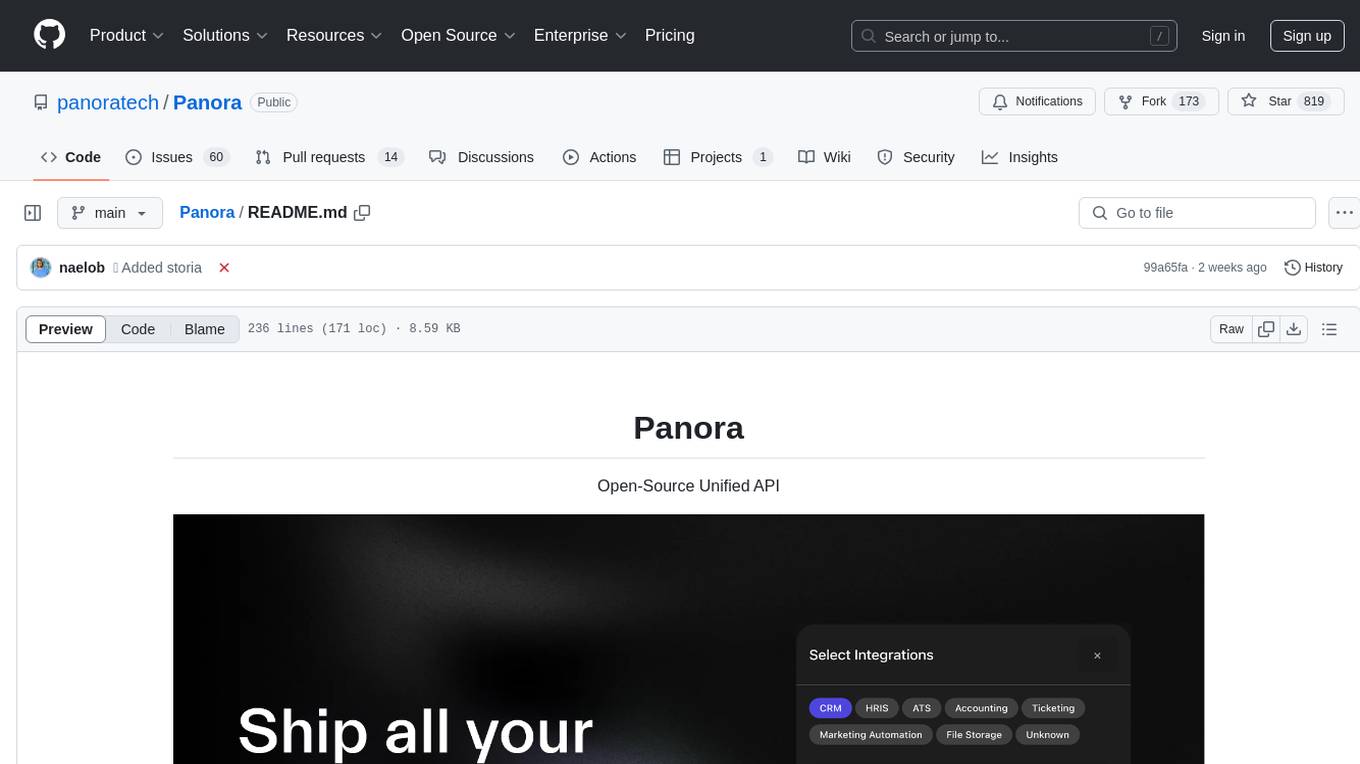
Panora is an open-source unified API tool that allows users to easily integrate and interact with various software platforms. It provides features like Magic Links for data access, Custom Fields for specific data points, Passthrough Requests for interacting with other platforms, and Webhooks for receiving normalized data. The tool supports integrations with CRM, Ticketing, ATS, HRIS, File Storage, Ecommerce, and more. Users can easily manage contacts, deals, notes, engagements, tasks, users, companies, and other data across different platforms. Panora aims to simplify data management and streamline workflows for businesses.
README:
- Prerequisite: You should have Git and Docker installed
- Get the code
git clone https://github.com/panoratech/Panora.git
- Go to Panora folder
cd Panora && cp .env.example .env
- Start
docker compose -f docker-compose.source.yml up
Panora is now running! Follow our Quickstart Guide to start adding integrations to your product !
See also our selfhost guide here !
If you want to chat with our codebase, feel free to use our friend's amazing tool !
| Magic Links: Let your users grant you access to their data. Without writing code. |
| Custom Fields: Reflect in Panora the specific data points that matter to your users |
| Passthrough Requests: Interact with other software platforms in their native format. |
| Webhooks: Listen to one webhook to receive normalized data from various software platforms |
Panora supports integration with the following objects across multiple platforms:
Here is an extensive list of all integrations !
| Contacts | Deals | Notes | Engagements | Tasks | Users | Companies | Stage | |
|---|---|---|---|---|---|---|---|---|
| Hubspot | ✔️ | ✔️ | ✔️ | ✔️ | ✔️ | ✔️ | ✔️ | |
| Pipedrive | ✔️ | ✔️ | ✔️ | ✔️ | ✔️ | ✔️ | ✔️ | |
| Zoho CRM | ✔️ | ✔️ | ✔️ | ✔️ | ✔️ | ✔️ | ||
| Zendesk Sell | ✔️ | ✔️ | ✔️ | ✔️ | ✔️ | ✔️ | ✔️ | |
| Attio | ✔️ | ✔️ | ✔️ | ✔️ | ✔️ | ✔️ | ✔️ | |
| Close | ✔️ | ✔️ | ✔️ | ✔️ | ✔️ | ✔️ | ✔️ | ✔️ |
| Tickets | Comments | Users | Contacts | Accounts | Tags | Teams | Collections | |
|---|---|---|---|---|---|---|---|---|
| Zendesk | ✔ | ✔ | ✔ | ✔ | ✔ | ✔ | ✔ | |
| Front | ✔ | ✔ | ✔ | ✔ | ✔ | ✔ | ✔ | |
| Jira | ✔ | ✔ | ✔ | ✔ | ✔ | ✔ | ||
| Gitlab | ✔ | ✔ | ✔ | ✔ | ||||
| Github | ✔ | ✔ | ✔ | ✔ | ✔ | ✔ | ✔ |
| Activities | Applications | Candidates | Departments | Interviews | Jobs | Offers | Offices | Scorecard | Users | Eeocs | Job Interview Stage | Tags | Reject Reasons | |
|---|---|---|---|---|---|---|---|---|---|---|---|---|---|---|
| Ashby | ✔ | ✔ | ✔ | ✔ | ✔ | ✔ | ✔ | ✔ | ✔ | ✔ | ✔ |
| Bankinfos | Benefits | Companies | Dependents | Employee | Employee Payroll Runs | Employer Benefits | Employments | Groups | Locations | Paygroups | Payrollrun | Timeoff | Timeoff Balances | Timesheet Entries | |
|---|---|---|---|---|---|---|---|---|---|---|---|---|---|---|---|
| Gusto | ✔ | ✔ | ✔ | ✔ | ✔ | ✔ | ✔ |
| Drives | Files | Folders | Groups | Users | Permissions | Shared Links | |
|---|---|---|---|---|---|---|---|
| Google Drive | ✔️ | ✔️ | ✔️ | ✔️ | ✔️ | ||
| Box | ✔️ | ✔️ | ✔️ | ✔️ | ✔️ | ||
| Dropbox | ✔️ | ✔️ | ✔️ | ✔️ | ✔️ | ||
| OneDrive | ✔️ | ✔️ | ✔️ | ✔️ | ✔️ | ||
| Sharepoint | ✔️ | ✔️ | ✔️ | ✔️ | ✔️ |
| Customers | Orders | Fulfillments | Fulfillment Orders | Products | |
|---|---|---|---|---|---|
| Amazon | ✔️ | ✔️ | |||
| Shopify | ✔️ | ✔️ | ✔️ | ✔️ | ✔️ |
| Squarespace | ✔️ | ✔️ | ✔️ | ||
| Woocommerce | ✔️ | ✔️ | ✔️ |
Your favourite software is missing? Ask the community to build a connector!
- [x] Access and manage data from any source, including documents, chunk & vectors
- [x] Semantic, keyword and hybrid search against a vector database
- [x] Microsoft Dynamics 365
- [x] Linear
- [x] Redtail CRM
- [x] Wealthbox
- [x] Leadsquared
- [x] Salesforce
- [ ] Affinity CRM
- [ ] Odoo
- [ ] Intelliflow
- [ ] Xplan
- [ ] Plannr
- [ ] ACT!
- [ ] Jungo
- [ ] Surefire
- [ ] Velocity
- [ ] Service Now
- [ ] Wrike
- [ ] Dixa
- [ ] Asana
- [ ] Aha
- [ ] Clickup
- [ ] Wave Financial
- [ ] Xero
- [ ] Quickbooks
- [x] Google Drive
- [x] Dropbox
- [x] Sharepoint
- [x] One Drive
- [ ] Slack
- [ ] Notion
- [ ] Workday
- [ ] ADP Workforce
- [x] Sage
- [x] Deel
- [ ] BambooHR
- [ ] Rippling
- [ ] Ebay
- [ ] Faire
- [x] Webflow
- [ ] Mercado Libre
- [ ] Prestashop
- [ ] Magento
- [ ] BigCommerce
- [ ] Greenhouse
- [ ] Lever
- [ ] Avature
- [ ] Snyk
- [ ] Qualys
- [ ] Crowdstrike
- [ ] Semgrep
- [ ] Rapids7InsightVm
- [ ] Tenable
- [ ] SentinelOne
- [ ] Microsoft Defender
- [ ] Netsuite (Accounting)
- [ ] SAP (ERP)
- [ ] Ariba
- [ ] Concur
- [ ] Magaya (TMS)
- [ ] Cargowise (TMS)
Want to contribute? Visit our guide or check our detailed integrations guide here.
Our guidelines.
For Tasks:
Click tags to check more tools for each tasksFor Jobs:
Alternative AI tools for Panora
Similar Open Source Tools

Panora
Panora is an open-source unified API tool that allows users to easily integrate and interact with various software platforms. It provides features like Magic Links for data access, Custom Fields for specific data points, Passthrough Requests for interacting with other platforms, and Webhooks for receiving normalized data. The tool supports integrations with CRM, Ticketing, ATS, HRIS, File Storage, Ecommerce, and more. Users can easily manage contacts, deals, notes, engagements, tasks, users, companies, and other data across different platforms. Panora aims to simplify data management and streamline workflows for businesses.
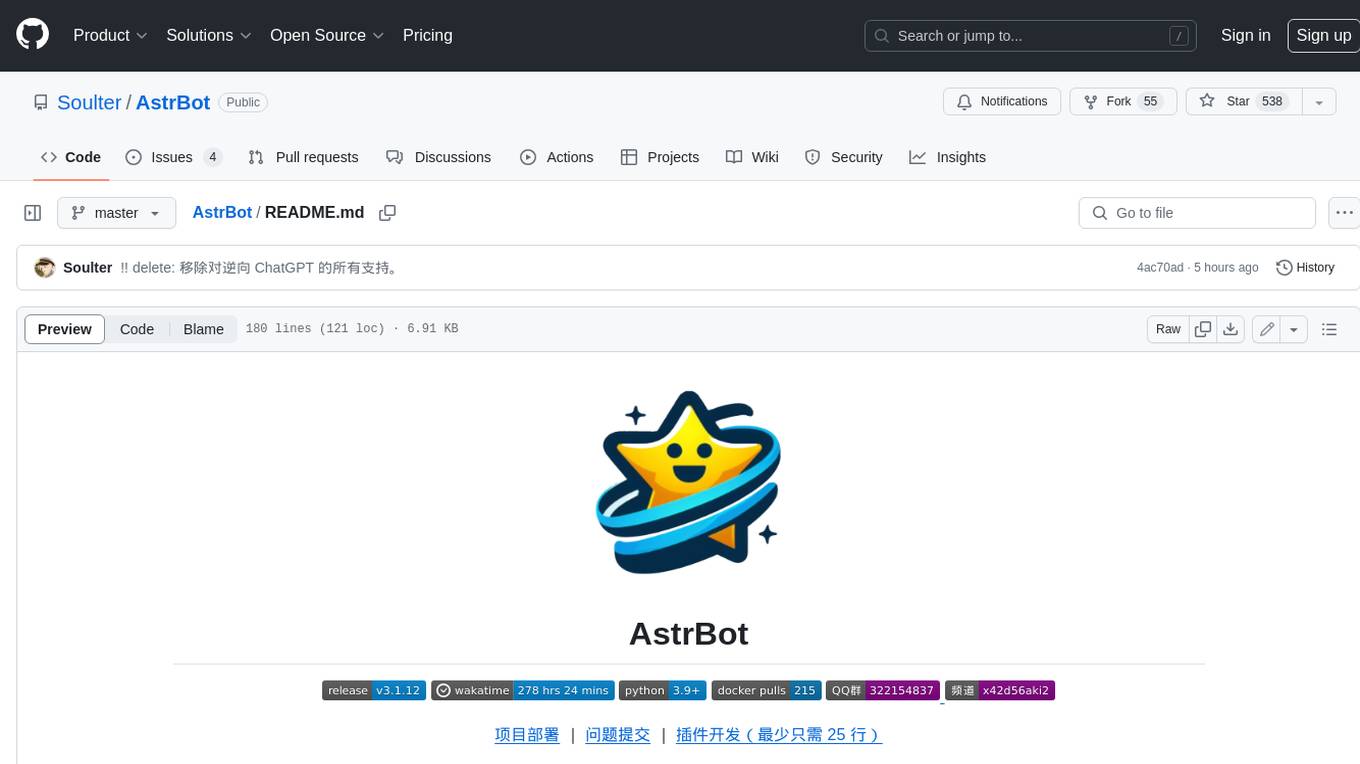
AstrBot
AstrBot is a powerful and versatile tool that leverages the capabilities of large language models (LLMs) like GPT-3, GPT-3.5, and GPT-4 to enhance communication and automate tasks. It seamlessly integrates with popular messaging platforms such as QQ, QQ Channel, and Telegram, enabling users to harness the power of AI within their daily conversations and workflows.
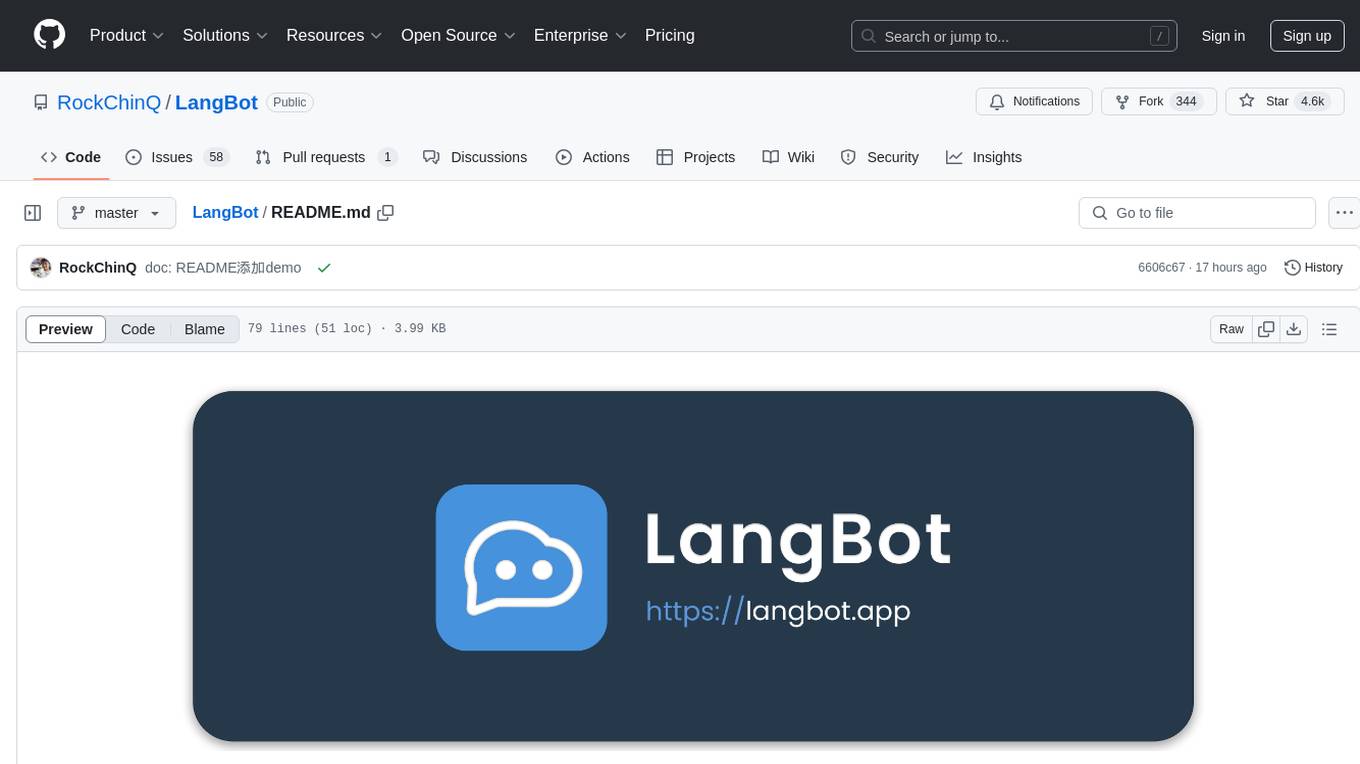
LangBot
LangBot is a highly stable, extensible, and multimodal instant messaging chatbot platform based on large language models. It supports various large models, adapts to group chats and private chats, and has capabilities for multi-turn conversations, tool invocation, and multimodal interactions. It is deeply integrated with Dify and currently supports QQ and QQ channels, with plans to support platforms like WeChat, WhatsApp, and Discord. The platform offers high stability, comprehensive functionality, native support for access control, rate limiting, sensitive word filtering mechanisms, and simple configuration with multiple deployment options. It also features plugin extension capabilities, an active community, and a new web management panel for managing LangBot instances through a browser.
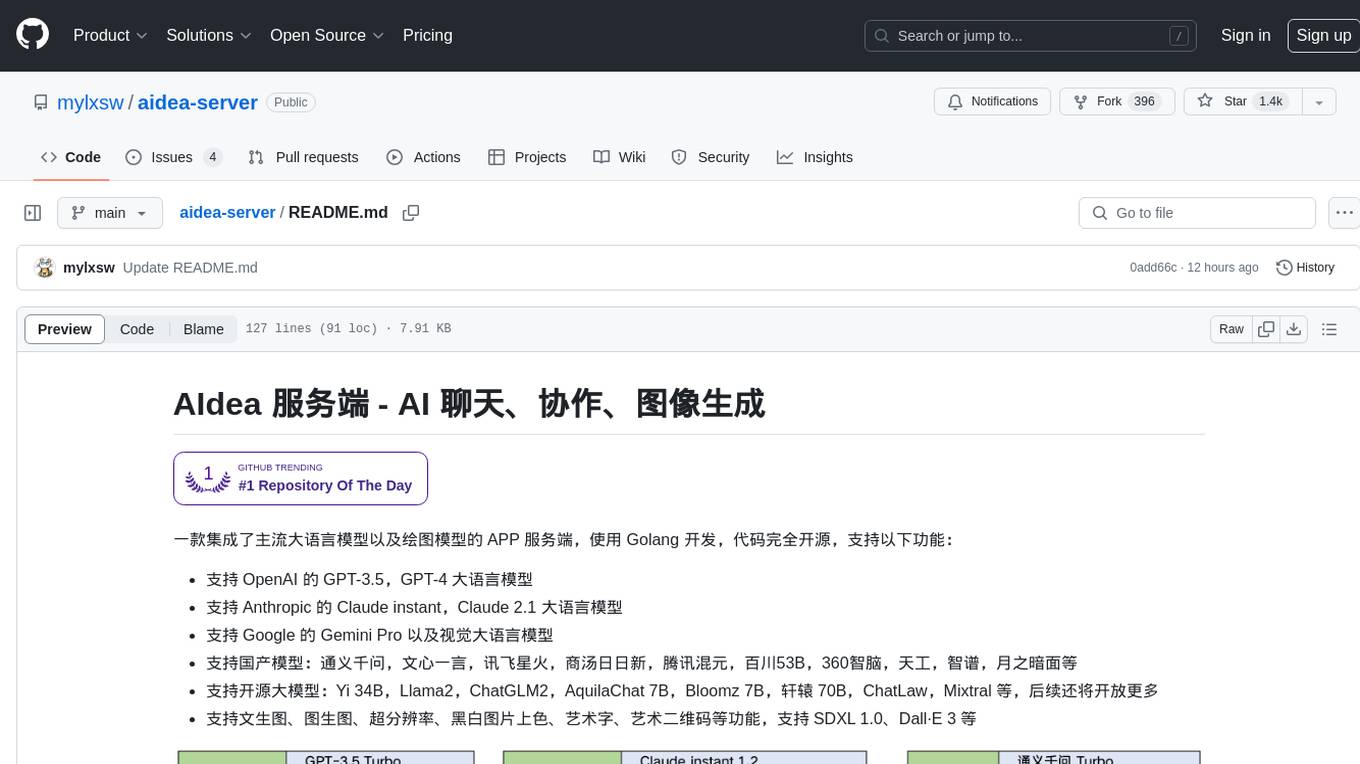
aidea-server
AIdea Server is an open-source Golang-based server that integrates mainstream large language models and drawing models. It supports various functionalities including OpenAI's GPT-3.5 and GPT-4, Anthropic's Claude instant and Claude 2.1, Google's Gemini Pro, as well as Chinese models like Tongyi Qianwen, Wenxin Yiyuan, and more. It also supports open-source large models like Yi 34B, Llama2, and AquilaChat 7B. Additionally, it provides features for text-to-image, super-resolution, coloring black and white images, generating art fonts and QR codes, among others.
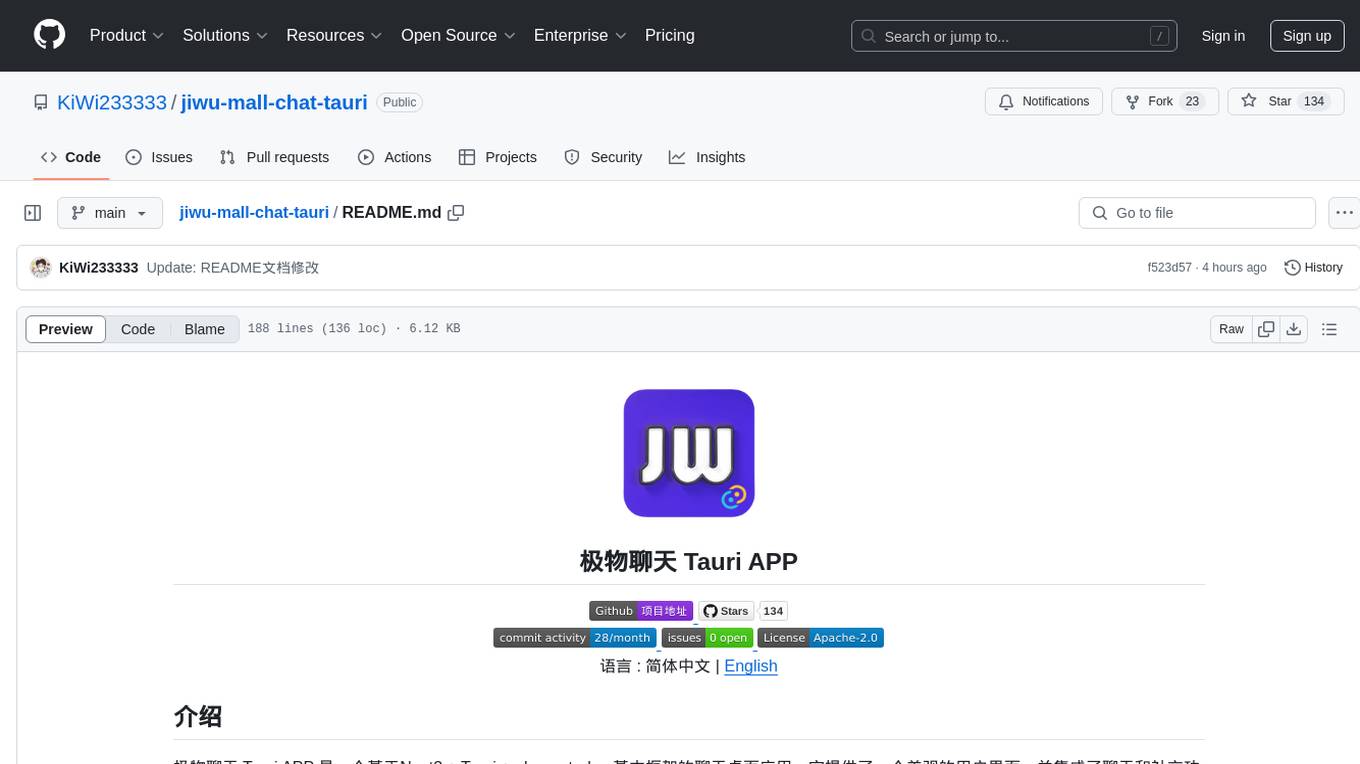
jiwu-mall-chat-tauri
Jiwu Chat Tauri APP is a desktop chat application based on Nuxt3 + Tauri + Element Plus framework. It provides a beautiful user interface with integrated chat and social functions. It also supports AI shopping chat and global dark mode. Users can engage in real-time chat, share updates, and interact with AI customer service through this application.
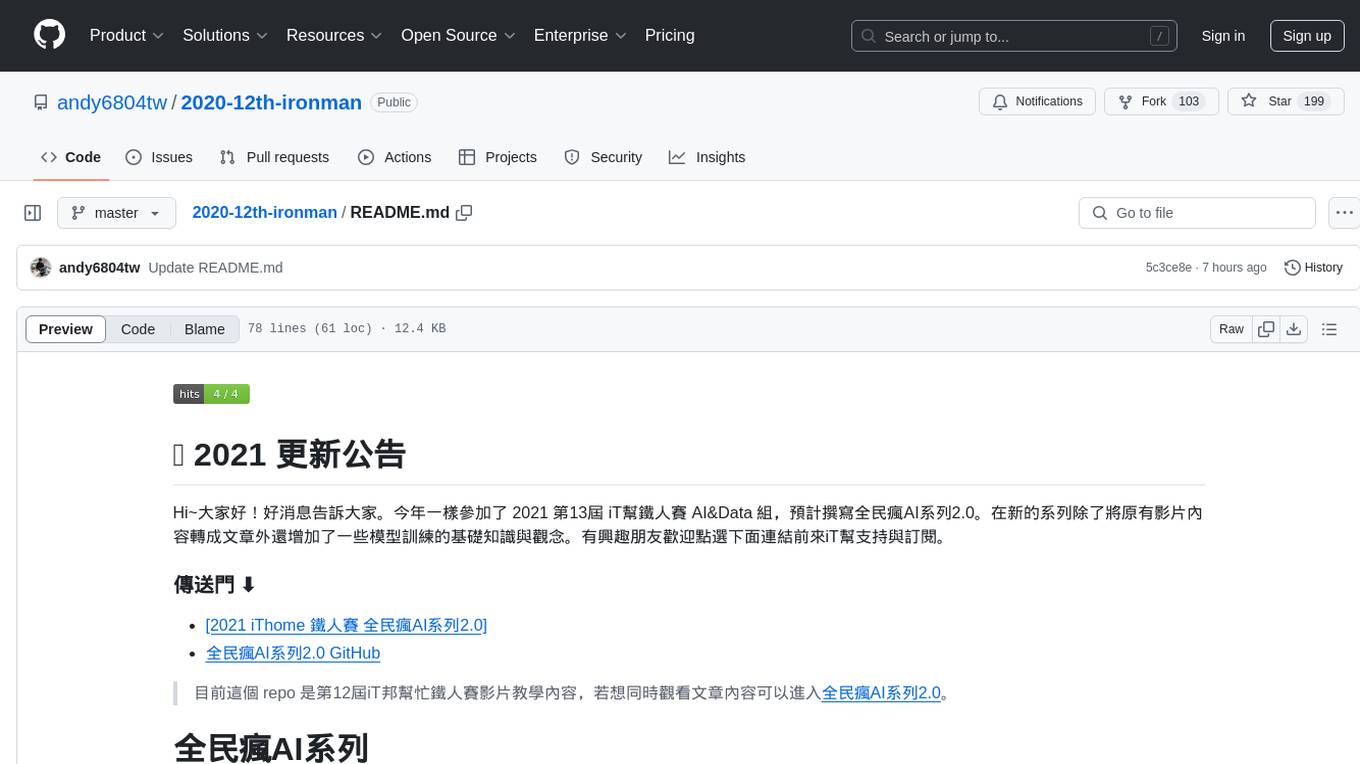
2020-12th-ironman
This repository contains tutorial content for the 12th iT Help Ironman competition, focusing on machine learning algorithms and their practical applications. The tutorials cover topics such as AI model integration, API server deployment techniques, and hands-on programming exercises. The series is presented in video format and will be compiled into an e-book in the future. Suitable for those familiar with Python, interested in implementing AI prediction models, data analysis, and backend integration and deployment of AI models.
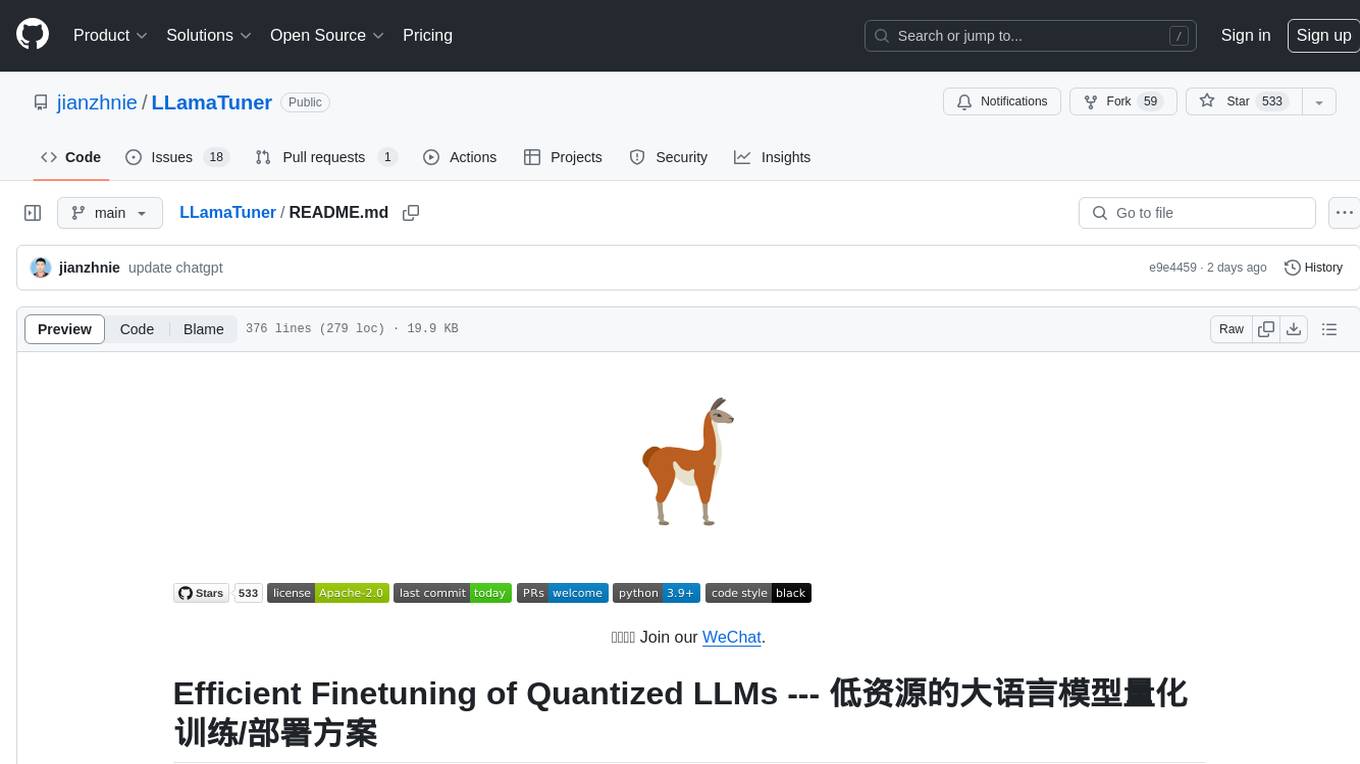
LLamaTuner
LLamaTuner is a repository for the Efficient Finetuning of Quantized LLMs project, focusing on building and sharing instruction-following Chinese baichuan-7b/LLaMA/Pythia/GLM model tuning methods. The project enables training on a single Nvidia RTX-2080TI and RTX-3090 for multi-round chatbot training. It utilizes bitsandbytes for quantization and is integrated with Huggingface's PEFT and transformers libraries. The repository supports various models, training approaches, and datasets for supervised fine-tuning, LoRA, QLoRA, and more. It also provides tools for data preprocessing and offers models in the Hugging Face model hub for inference and finetuning. The project is licensed under Apache 2.0 and acknowledges contributions from various open-source contributors.
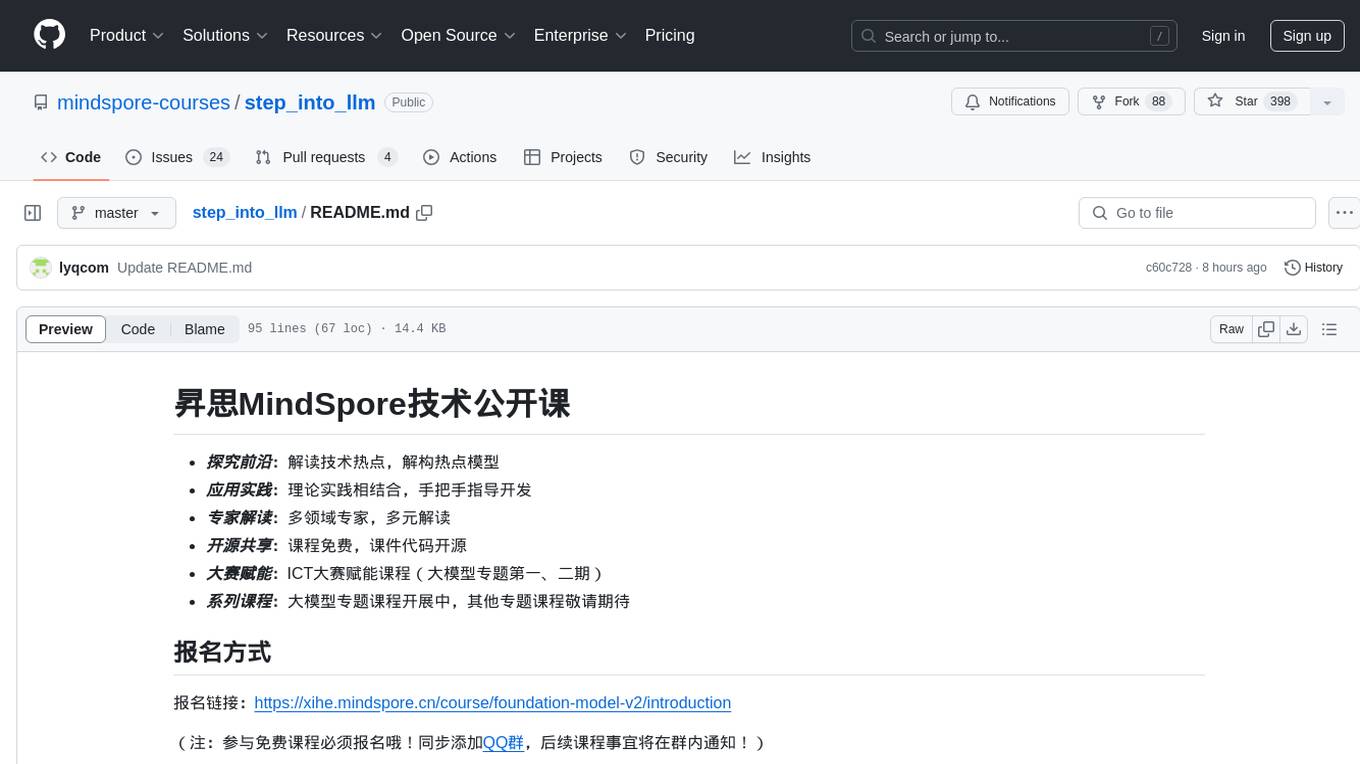
step_into_llm
The 'step_into_llm' repository is dedicated to the 昇思MindSpore technology open class, which focuses on exploring cutting-edge technologies, combining theory with practical applications, expert interpretations, open sharing, and empowering competitions. The repository contains course materials, including slides and code, for the ongoing second phase of the course. It covers various topics related to large language models (LLMs) such as Transformer, BERT, GPT, GPT2, and more. The course aims to guide developers interested in LLMs from theory to practical implementation, with a special emphasis on the development and application of large models.
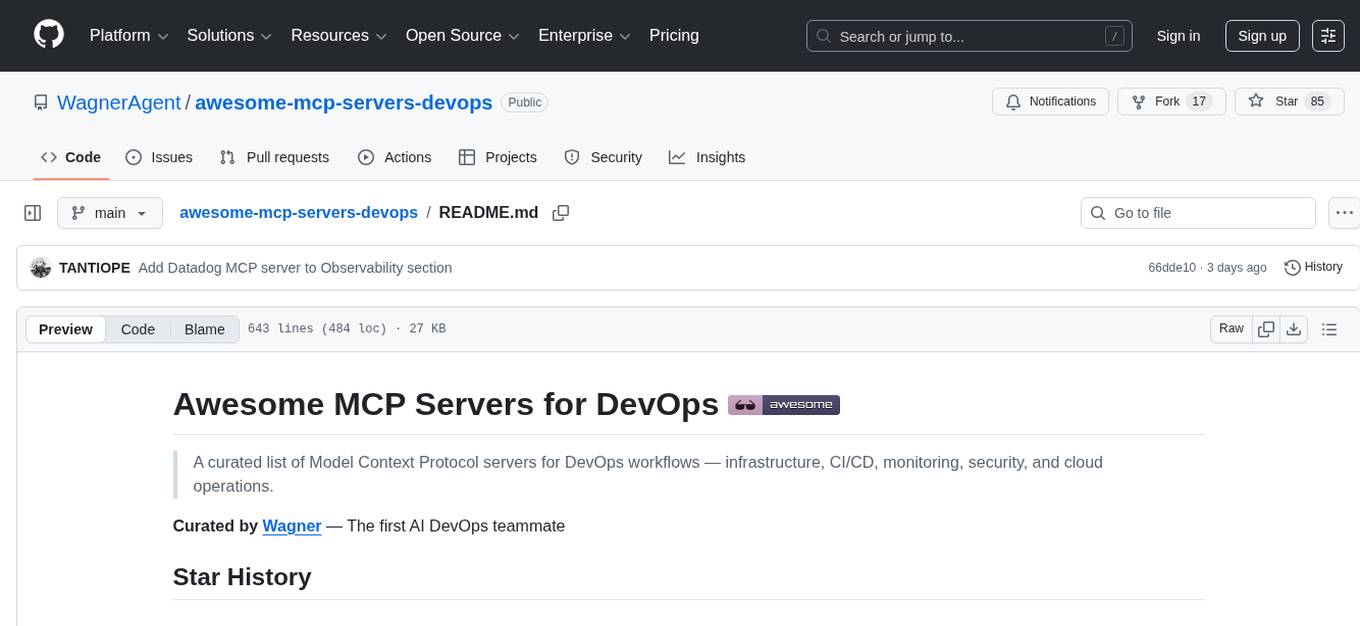
awesome-mcp-servers-devops
This repository, 'awesome-mcp-servers-devops', is a curated list of Model Context Protocol servers for DevOps workflows. It includes servers for various aspects of DevOps such as infrastructure, CI/CD, monitoring, security, and cloud operations. The repository provides information on different MCP servers available for tools like GitHub, GitLab, Azure DevOps, Gitea, Terraform, Vault, Pulumi, Kubernetes, Docker Hub, Portainer, Qovery, various command line and local operation tools, browser automation tools, code execution tools, coding agents, aggregators, CI/CD tools like Argo CD, Jenkins, GitHub Actions, Codemagic, DevOps visibility tools, build tools, cloud platforms like AWS, Azure, Cloudflare, Alibaba Cloud, observability tools like Grafana, Datadog, Prometheus, VictoriaMetrics, Alertmanager, APM & monitoring tools, security tools like Snyk, Semgrep, and community security servers, collaboration tools like Atlassian, Jira, project management tools, service desks, Notion, and more.
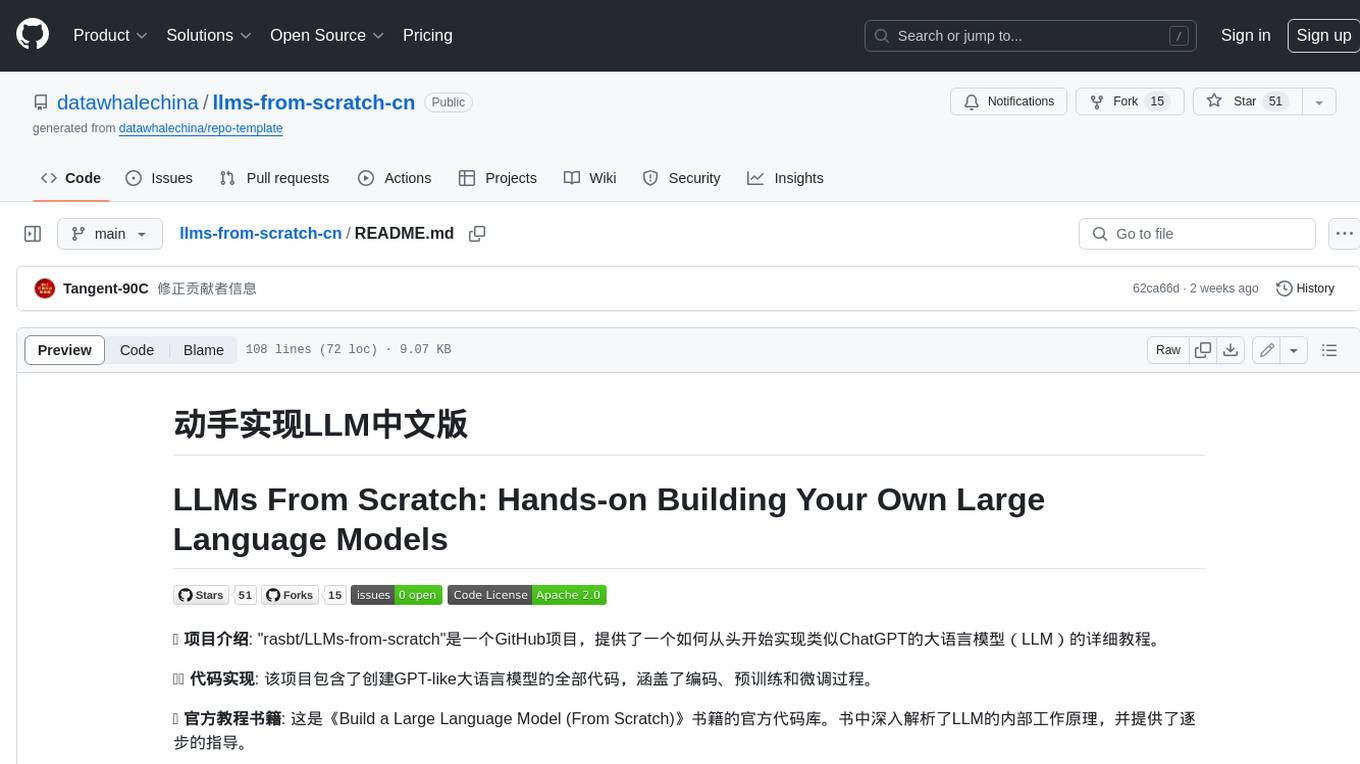
llms-from-scratch-cn
This repository provides a detailed tutorial on how to build your own large language model (LLM) from scratch. It includes all the code necessary to create a GPT-like LLM, covering the encoding, pre-training, and fine-tuning processes. The tutorial is written in a clear and concise style, with plenty of examples and illustrations to help you understand the concepts involved. It is suitable for developers and researchers with some programming experience who are interested in learning more about LLMs and how to build them.
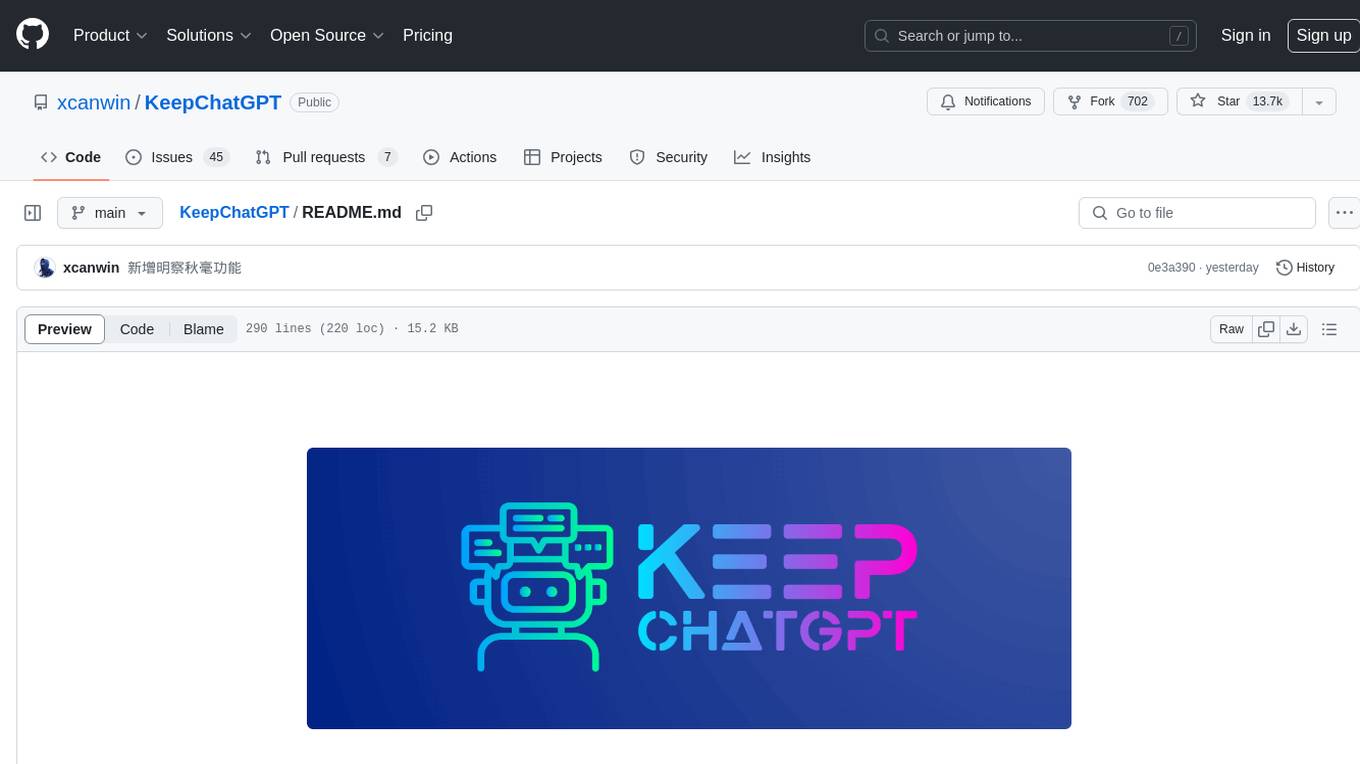
KeepChatGPT
KeepChatGPT is a plugin designed to enhance the data security capabilities and efficiency of ChatGPT. It aims to make your chat experience incredibly smooth, eliminating dozens or even hundreds of unnecessary steps, and permanently getting rid of various errors and warnings. It offers innovative features such as automatic refresh, activity maintenance, data security, audit cancellation, conversation cloning, endless conversations, page purification, large screen display, full screen display, tracking interception, rapid changes, and detailed insights. The plugin ensures that your AI experience is secure, smooth, efficient, concise, and seamless.
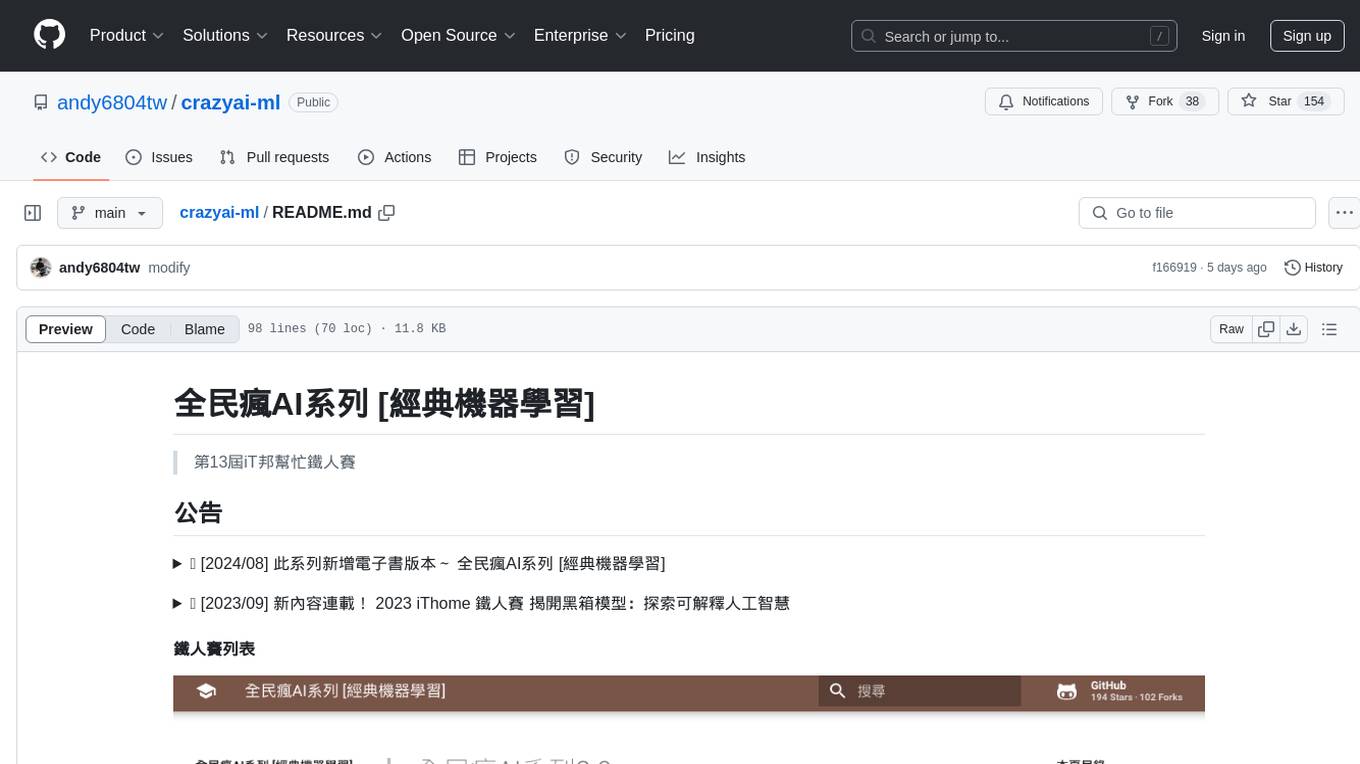
crazyai-ml
The 'crazyai-ml' repository is a collection of resources related to machine learning, specifically focusing on explaining artificial intelligence models. It includes articles, code snippets, and tutorials covering various machine learning algorithms, data analysis, model training, and deployment. The content aims to provide a comprehensive guide for beginners in the field of AI, offering practical implementations and insights into popular machine learning packages and model tuning techniques. The repository also addresses the integration of AI models and frontend-backend concepts, making it a valuable resource for individuals interested in AI applications.
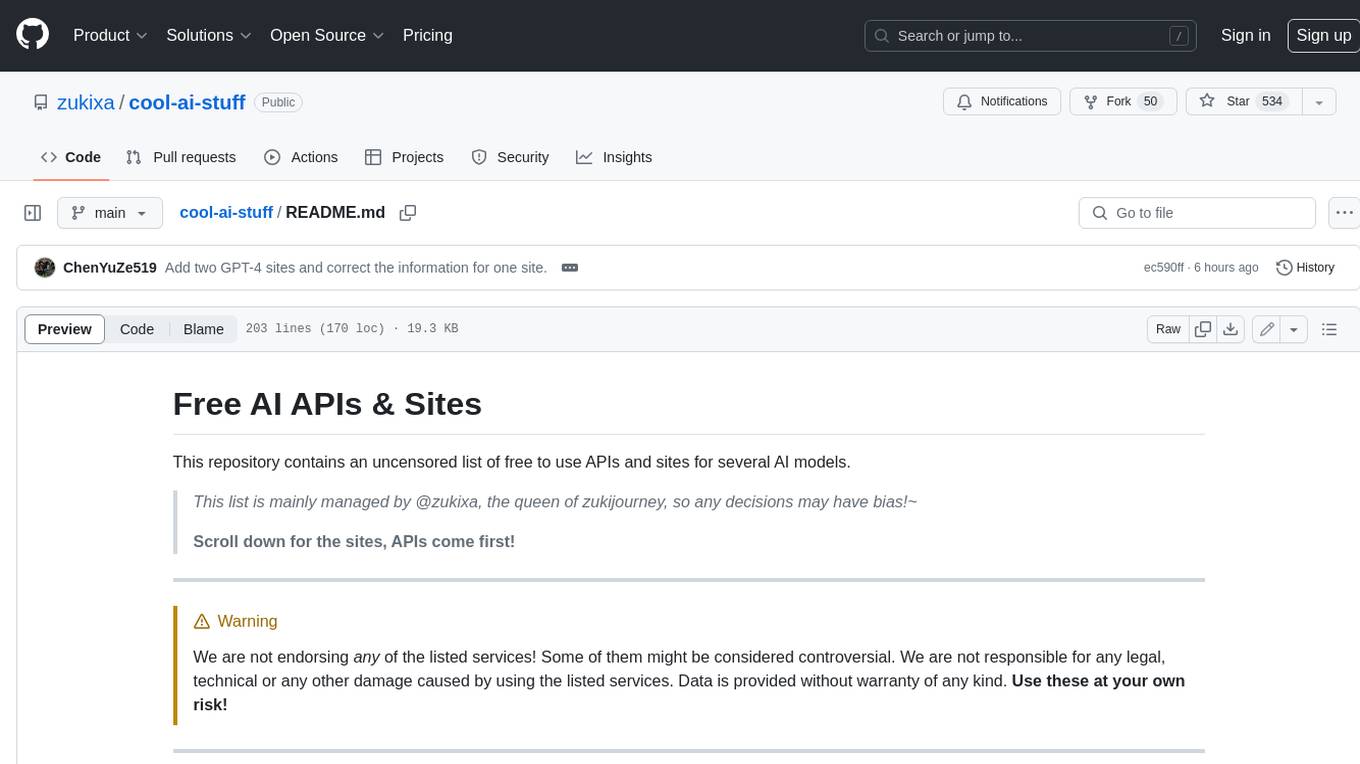
cool-ai-stuff
This repository contains an uncensored list of free to use APIs and sites for several AI models. > _This list is mainly managed by @zukixa, the queen of zukijourney, so any decisions may have bias!~_ > > **Scroll down for the sites, APIs come first!** * * * > [!WARNING] > We are not endorsing _any_ of the listed services! Some of them might be considered controversial. We are not responsible for any legal, technical or any other damage caused by using the listed services. Data is provided without warranty of any kind. **Use these at your own risk!** * * * # APIs Table of Contents #### Overview of Existing APIs #### Overview of Existing APIs -- Top LLM Models Available #### Overview of Existing APIs -- Top Image Models Available #### Overview of Existing APIs -- Top Other Features & Models Available #### Overview of Existing APIs -- Available Donator Perks * * * ## API List:* *: This list solely covers all providers I (@zukixa) was able to collect metrics in. Any mistakes are not my responsibility, as I am either banned, or not aware of x API. \ 1: Last Updated 4/14/24 ### Overview of APIs: | Service | # of Users1 | Link | Stablity | NSFW Ok? | Open Source? | Owner(s) | Other Notes | | ----------- | ---------- | ------------------------------------------ | ------------------------------------------ | --------------------------- | ------------------------------------------------------ | -------------------------- | ----------------------------------------------------------------------------------------------------------- | | zukijourney| 4441 | D | High | On /unf/, not /v1/ | ✅, Here | @zukixa | Largest & Oldest GPT-4 API still continuously around. Offers other popular AI-related Bots too. | | Hyzenberg| 1234 | D | High | Forbidden | ❌ | @thatlukinhasguy & @voidiii | Experimental sister API to Zukijourney. Successor to HentAI | | NagaAI | 2883 | D | High | Forbidden | ❌ | @zentixua | Honorary successor to ChimeraGPT, the largest API in history (15k users). | | WebRaftAI | 993 | D | High | Forbidden | ❌ | @ds_gamer | Largest API by model count. Provides a lot of service/hosting related stuff too. | | KrakenAI | 388 | D | High | Discouraged | ❌ | @paninico | It is an API of all time. | | ShuttleAI | 3585 | D | Medium | Generally Permitted | ❌ | @xtristan | Faked GPT-4 Before 1, 2 | | Mandrill | 931 | D | Medium | Enterprise-Tier-Only | ❌ | @fredipy | DALL-E-3 access pioneering API. Has some issues with speed & stability nowadays. | oxygen | 742 | D | Medium | Donator-Only | ❌ | @thesketchubuser | Bri'ish 🤮 & Fren'sh 🤮 | | Skailar | 399 | D | Medium | Forbidden | ❌ | @aquadraws | Service is the personification of the word 'feature creep'. Lots of things announced, not much operational. |
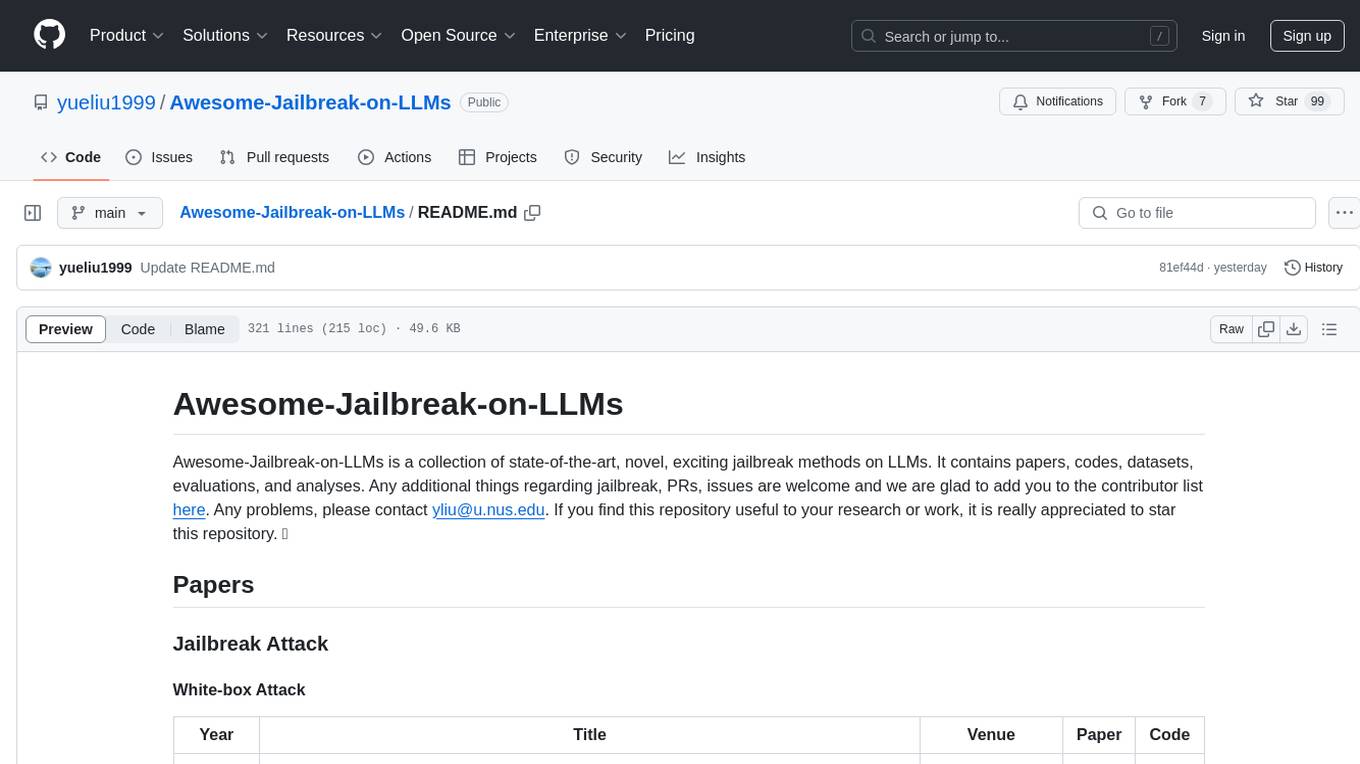
Awesome-Jailbreak-on-LLMs
Awesome-Jailbreak-on-LLMs is a collection of state-of-the-art, novel, and exciting jailbreak methods on Large Language Models (LLMs). The repository contains papers, codes, datasets, evaluations, and analyses related to jailbreak attacks on LLMs. It serves as a comprehensive resource for researchers and practitioners interested in exploring various jailbreak techniques and defenses in the context of LLMs. Contributions such as additional jailbreak-related content, pull requests, and issue reports are welcome, and contributors are acknowledged. For any inquiries or issues, contact [email protected]. If you find this repository useful for your research or work, consider starring it to show appreciation.
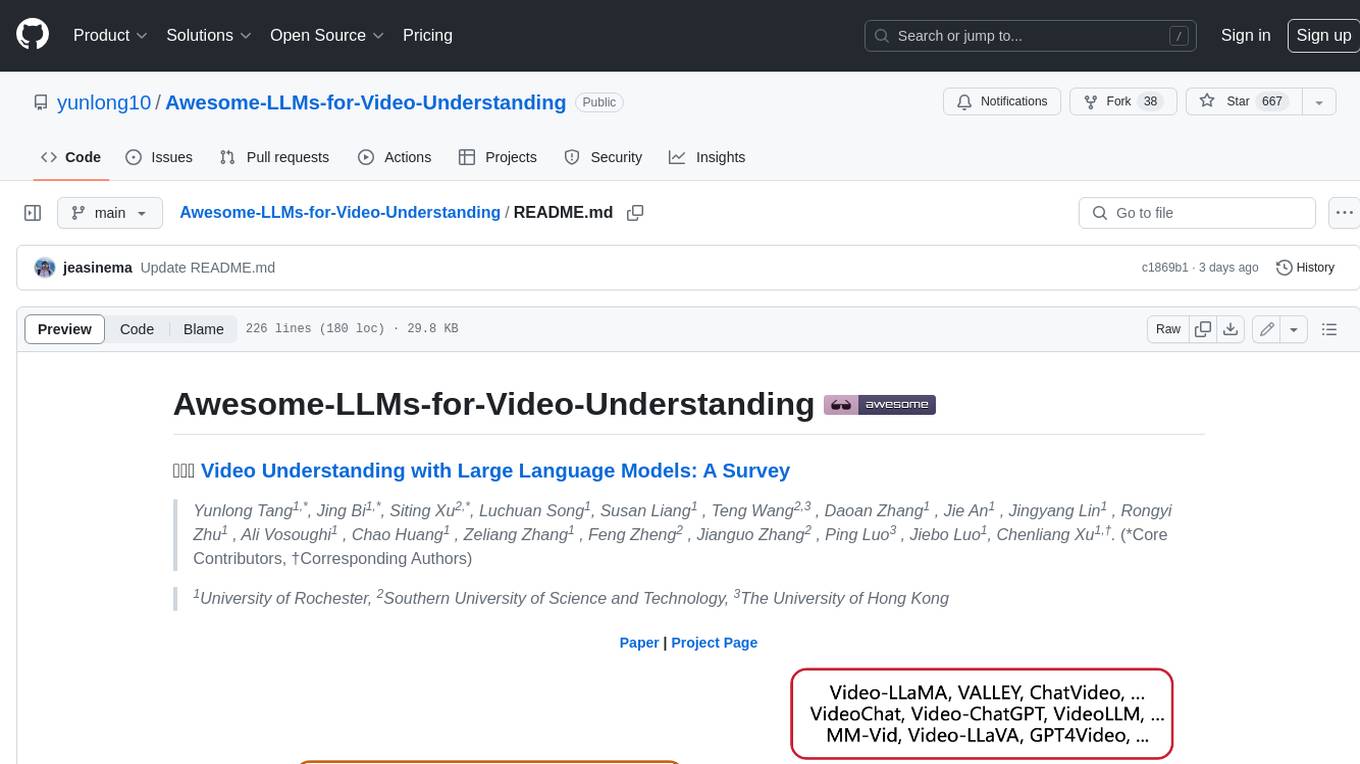
Awesome-LLMs-for-Video-Understanding
Awesome-LLMs-for-Video-Understanding is a repository dedicated to exploring Video Understanding with Large Language Models. It provides a comprehensive survey of the field, covering models, pretraining, instruction tuning, and hybrid methods. The repository also includes information on tasks, datasets, and benchmarks related to video understanding. Contributors are encouraged to add new papers, projects, and materials to enhance the repository.
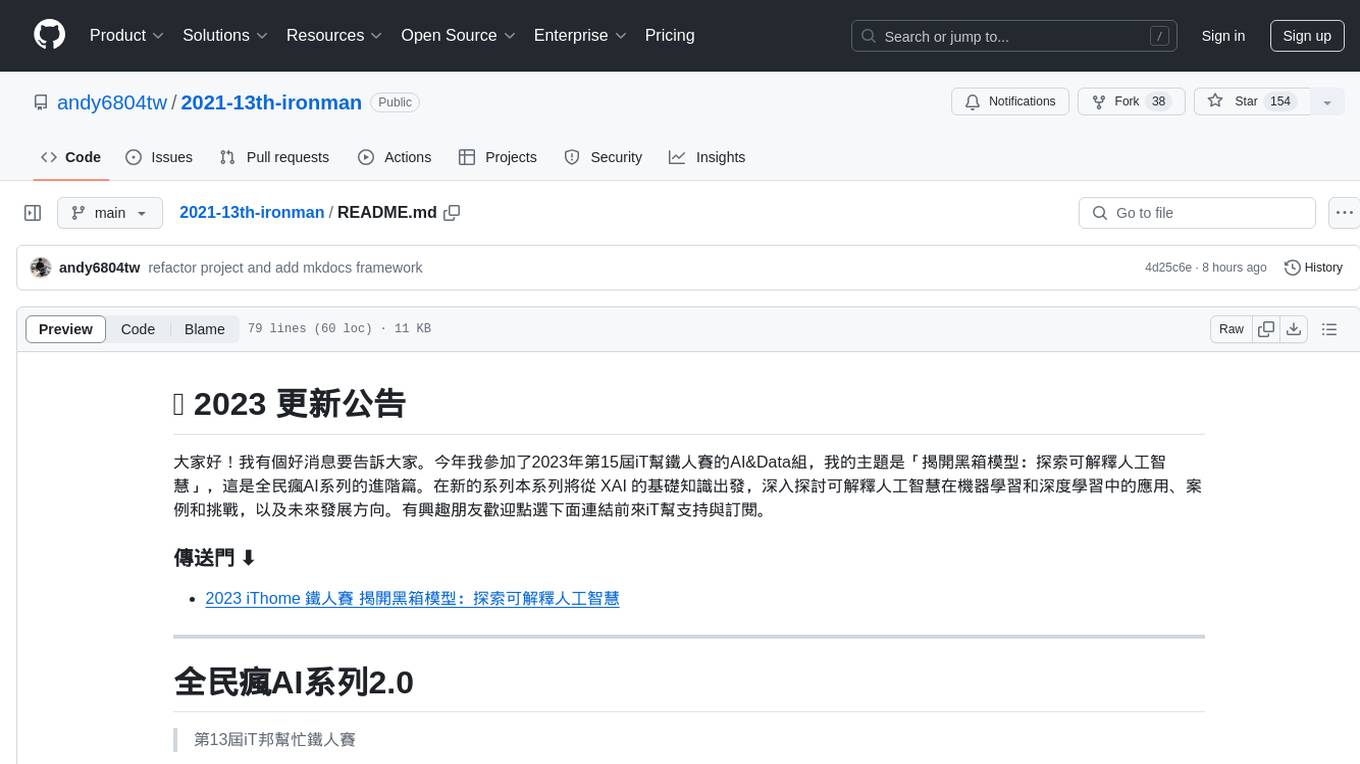
2021-13th-ironman
This repository is a part of the 13th iT Help Ironman competition, focusing on exploring explainable artificial intelligence (XAI) in machine learning and deep learning. The content covers the basics of XAI, its applications, cases, challenges, and future directions. It also includes practical machine learning algorithms, model deployment, and integration concepts. The author aims to provide detailed resources on AI and share knowledge with the audience through this competition.
For similar tasks

autogen
AutoGen is a framework that enables the development of LLM applications using multiple agents that can converse with each other to solve tasks. AutoGen agents are customizable, conversable, and seamlessly allow human participation. They can operate in various modes that employ combinations of LLMs, human inputs, and tools.

tracecat
Tracecat is an open-source automation platform for security teams. It's designed to be simple but powerful, with a focus on AI features and a practitioner-obsessed UI/UX. Tracecat can be used to automate a variety of tasks, including phishing email investigation, evidence collection, and remediation plan generation.

ciso-assistant-community
CISO Assistant is a tool that helps organizations manage their cybersecurity posture and compliance. It provides a centralized platform for managing security controls, threats, and risks. CISO Assistant also includes a library of pre-built frameworks and tools to help organizations quickly and easily implement best practices.
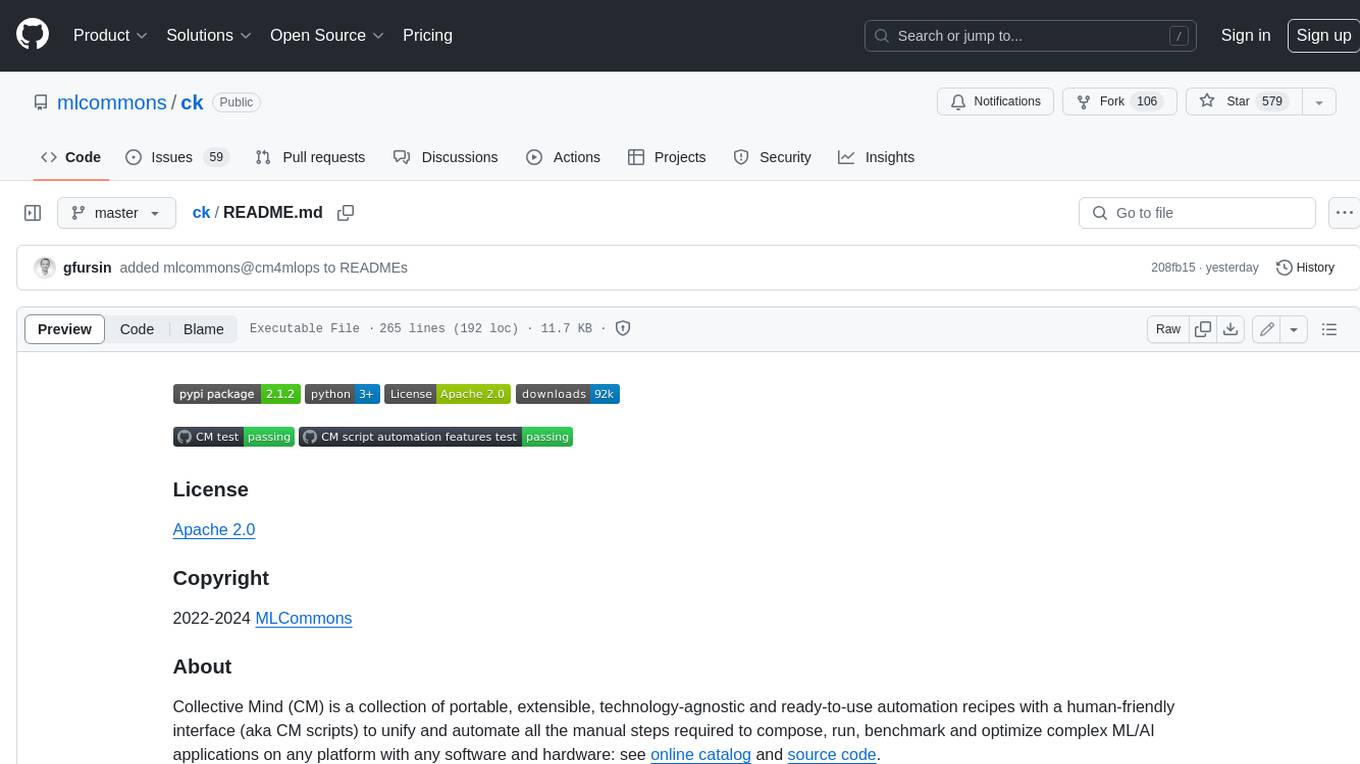
ck
Collective Mind (CM) is a collection of portable, extensible, technology-agnostic and ready-to-use automation recipes with a human-friendly interface (aka CM scripts) to unify and automate all the manual steps required to compose, run, benchmark and optimize complex ML/AI applications on any platform with any software and hardware: see online catalog and source code. CM scripts require Python 3.7+ with minimal dependencies and are continuously extended by the community and MLCommons members to run natively on Ubuntu, MacOS, Windows, RHEL, Debian, Amazon Linux and any other operating system, in a cloud or inside automatically generated containers while keeping backward compatibility - please don't hesitate to report encountered issues here and contact us via public Discord Server to help this collaborative engineering effort! CM scripts were originally developed based on the following requirements from the MLCommons members to help them automatically compose and optimize complex MLPerf benchmarks, applications and systems across diverse and continuously changing models, data sets, software and hardware from Nvidia, Intel, AMD, Google, Qualcomm, Amazon and other vendors: * must work out of the box with the default options and without the need to edit some paths, environment variables and configuration files; * must be non-intrusive, easy to debug and must reuse existing user scripts and automation tools (such as cmake, make, ML workflows, python poetry and containers) rather than substituting them; * must have a very simple and human-friendly command line with a Python API and minimal dependencies; * must require minimal or zero learning curve by using plain Python, native scripts, environment variables and simple JSON/YAML descriptions instead of inventing new workflow languages; * must have the same interface to run all automations natively, in a cloud or inside containers. CM scripts were successfully validated by MLCommons to modularize MLPerf inference benchmarks and help the community automate more than 95% of all performance and power submissions in the v3.1 round across more than 120 system configurations (models, frameworks, hardware) while reducing development and maintenance costs.
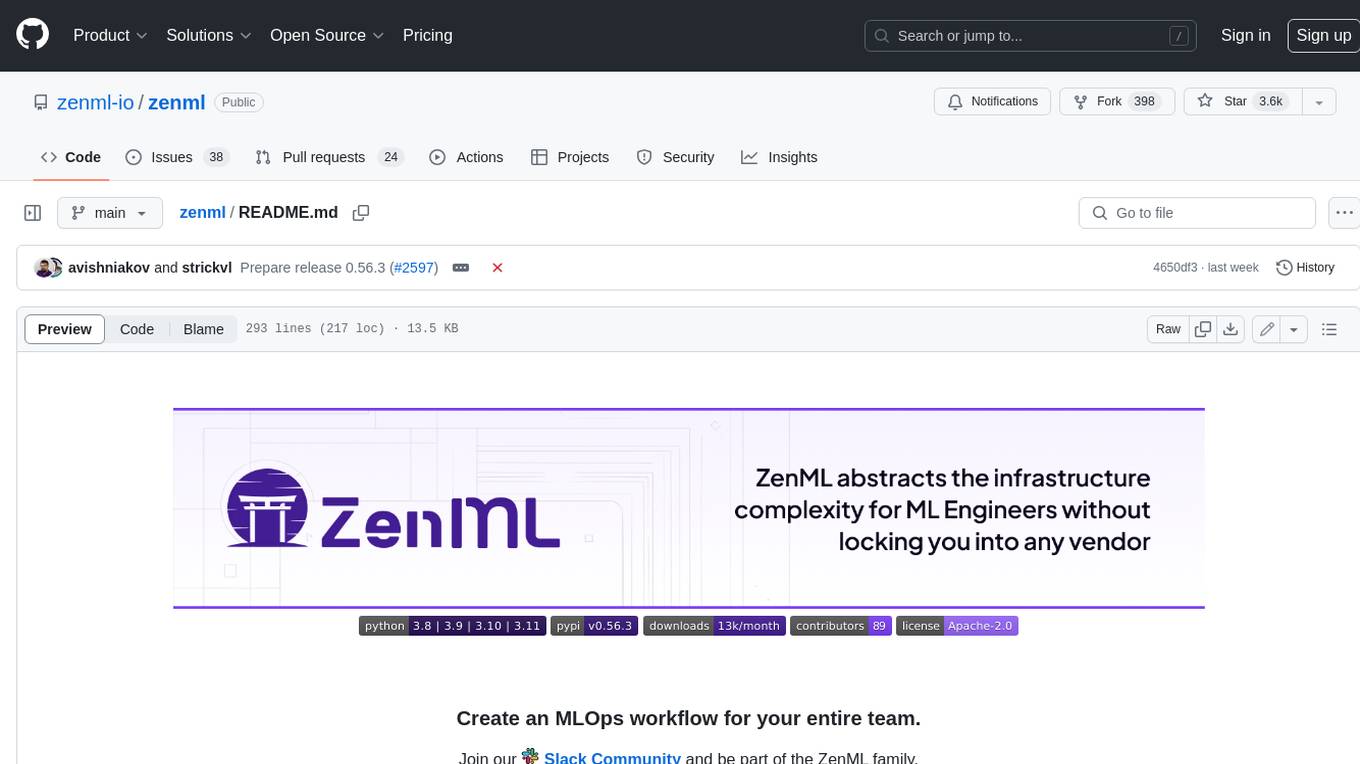
zenml
ZenML is an extensible, open-source MLOps framework for creating portable, production-ready machine learning pipelines. By decoupling infrastructure from code, ZenML enables developers across your organization to collaborate more effectively as they develop to production.

clearml
ClearML is a suite of tools designed to streamline the machine learning workflow. It includes an experiment manager, MLOps/LLMOps, data management, and model serving capabilities. ClearML is open-source and offers a free tier hosting option. It supports various ML/DL frameworks and integrates with Jupyter Notebook and PyCharm. ClearML provides extensive logging capabilities, including source control info, execution environment, hyper-parameters, and experiment outputs. It also offers automation features, such as remote job execution and pipeline creation. ClearML is designed to be easy to integrate, requiring only two lines of code to add to existing scripts. It aims to improve collaboration, visibility, and data transparency within ML teams.

devchat
DevChat is an open-source workflow engine that enables developers to create intelligent, automated workflows for engaging with users through a chat panel within their IDEs. It combines script writing flexibility, latest AI models, and an intuitive chat GUI to enhance user experience and productivity. DevChat simplifies the integration of AI in software development, unlocking new possibilities for developers.
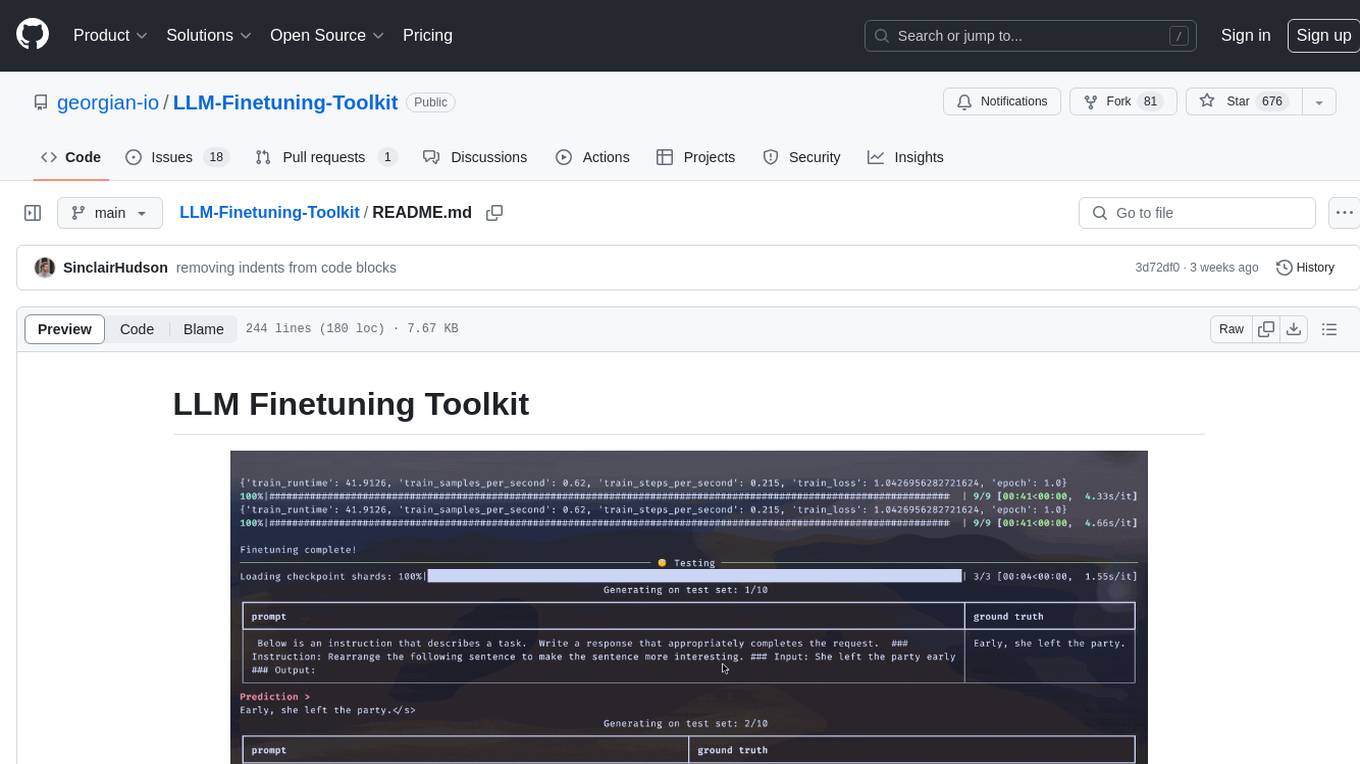
LLM-Finetuning-Toolkit
LLM Finetuning toolkit is a config-based CLI tool for launching a series of LLM fine-tuning experiments on your data and gathering their results. It allows users to control all elements of a typical experimentation pipeline - prompts, open-source LLMs, optimization strategy, and LLM testing - through a single YAML configuration file. The toolkit supports basic, intermediate, and advanced usage scenarios, enabling users to run custom experiments, conduct ablation studies, and automate fine-tuning workflows. It provides features for data ingestion, model definition, training, inference, quality assurance, and artifact outputs, making it a comprehensive tool for fine-tuning large language models.
For similar jobs

Azure-Analytics-and-AI-Engagement
The Azure-Analytics-and-AI-Engagement repository provides packaged Industry Scenario DREAM Demos with ARM templates (Containing a demo web application, Power BI reports, Synapse resources, AML Notebooks etc.) that can be deployed in a customer’s subscription using the CAPE tool within a matter of few hours. Partners can also deploy DREAM Demos in their own subscriptions using DPoC.

skyvern
Skyvern automates browser-based workflows using LLMs and computer vision. It provides a simple API endpoint to fully automate manual workflows, replacing brittle or unreliable automation solutions. Traditional approaches to browser automations required writing custom scripts for websites, often relying on DOM parsing and XPath-based interactions which would break whenever the website layouts changed. Instead of only relying on code-defined XPath interactions, Skyvern adds computer vision and LLMs to the mix to parse items in the viewport in real-time, create a plan for interaction and interact with them. This approach gives us a few advantages: 1. Skyvern can operate on websites it’s never seen before, as it’s able to map visual elements to actions necessary to complete a workflow, without any customized code 2. Skyvern is resistant to website layout changes, as there are no pre-determined XPaths or other selectors our system is looking for while trying to navigate 3. Skyvern leverages LLMs to reason through interactions to ensure we can cover complex situations. Examples include: 1. If you wanted to get an auto insurance quote from Geico, the answer to a common question “Were you eligible to drive at 18?” could be inferred from the driver receiving their license at age 16 2. If you were doing competitor analysis, it’s understanding that an Arnold Palmer 22 oz can at 7/11 is almost definitely the same product as a 23 oz can at Gopuff (even though the sizes are slightly different, which could be a rounding error!) Want to see examples of Skyvern in action? Jump to #real-world-examples-of- skyvern

pandas-ai
PandasAI is a Python library that makes it easy to ask questions to your data in natural language. It helps you to explore, clean, and analyze your data using generative AI.
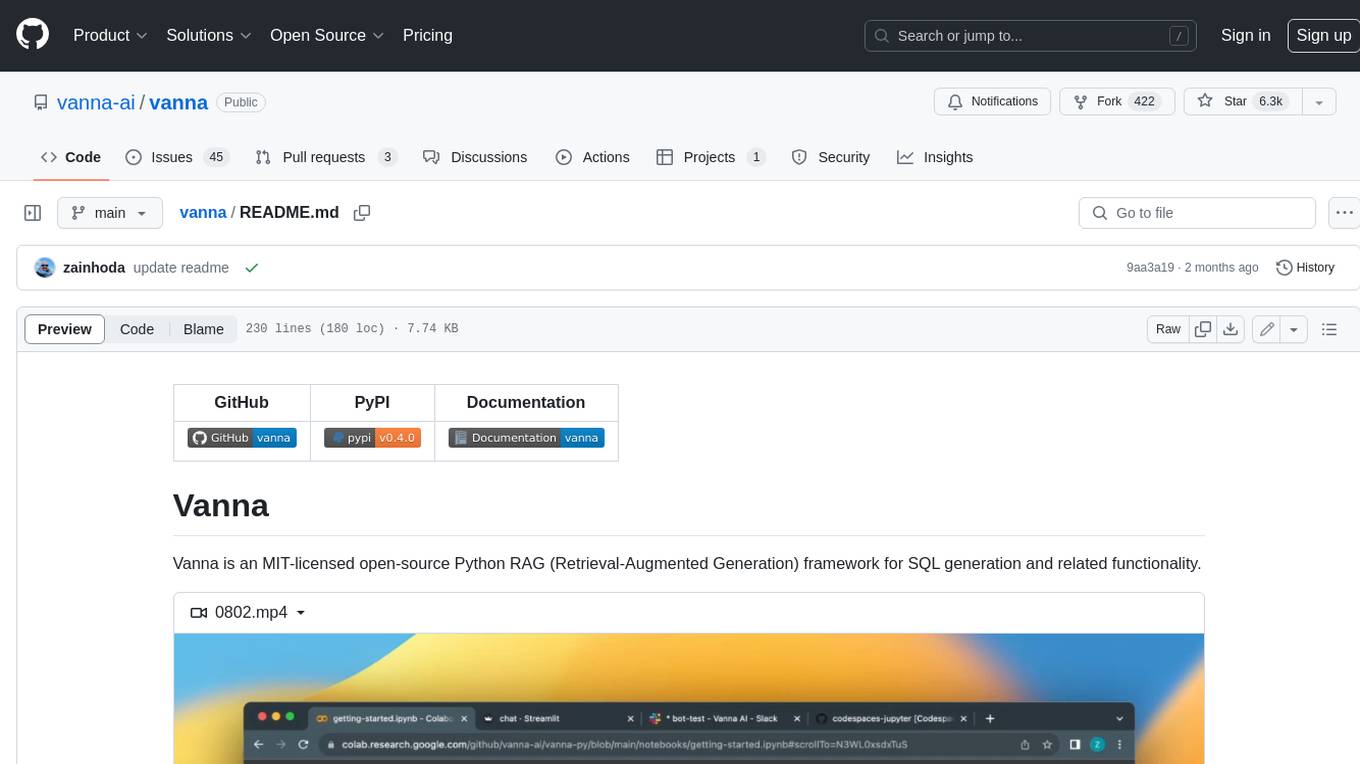
vanna
Vanna is an open-source Python framework for SQL generation and related functionality. It uses Retrieval-Augmented Generation (RAG) to train a model on your data, which can then be used to ask questions and get back SQL queries. Vanna is designed to be portable across different LLMs and vector databases, and it supports any SQL database. It is also secure and private, as your database contents are never sent to the LLM or the vector database.

databend
Databend is an open-source cloud data warehouse that serves as a cost-effective alternative to Snowflake. With its focus on fast query execution and data ingestion, it's designed for complex analysis of the world's largest datasets.

Avalonia-Assistant
Avalonia-Assistant is an open-source desktop intelligent assistant that aims to provide a user-friendly interactive experience based on the Avalonia UI framework and the integration of Semantic Kernel with OpenAI or other large LLM models. By utilizing Avalonia-Assistant, you can perform various desktop operations through text or voice commands, enhancing your productivity and daily office experience.
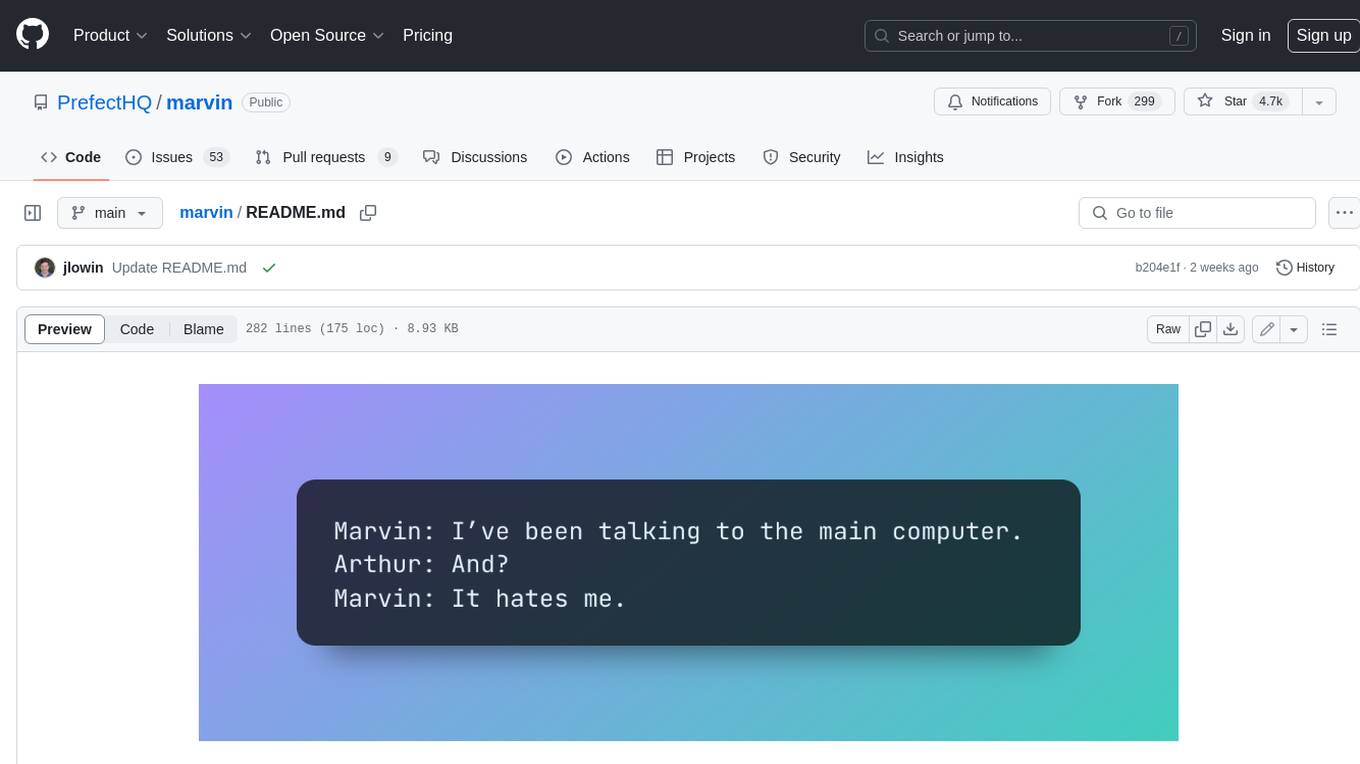
marvin
Marvin is a lightweight AI toolkit for building natural language interfaces that are reliable, scalable, and easy to trust. Each of Marvin's tools is simple and self-documenting, using AI to solve common but complex challenges like entity extraction, classification, and generating synthetic data. Each tool is independent and incrementally adoptable, so you can use them on their own or in combination with any other library. Marvin is also multi-modal, supporting both image and audio generation as well using images as inputs for extraction and classification. Marvin is for developers who care more about _using_ AI than _building_ AI, and we are focused on creating an exceptional developer experience. Marvin users should feel empowered to bring tightly-scoped "AI magic" into any traditional software project with just a few extra lines of code. Marvin aims to merge the best practices for building dependable, observable software with the best practices for building with generative AI into a single, easy-to-use library. It's a serious tool, but we hope you have fun with it. Marvin is open-source, free to use, and made with 💙 by the team at Prefect.

activepieces
Activepieces is an open source replacement for Zapier, designed to be extensible through a type-safe pieces framework written in Typescript. It features a user-friendly Workflow Builder with support for Branches, Loops, and Drag and Drop. Activepieces integrates with Google Sheets, OpenAI, Discord, and RSS, along with 80+ other integrations. The list of supported integrations continues to grow rapidly, thanks to valuable contributions from the community. Activepieces is an open ecosystem; all piece source code is available in the repository, and they are versioned and published directly to npmjs.com upon contributions. If you cannot find a specific piece on the pieces roadmap, please submit a request by visiting the following link: Request Piece Alternatively, if you are a developer, you can quickly build your own piece using our TypeScript framework. For guidance, please refer to the following guide: Contributor's Guide
